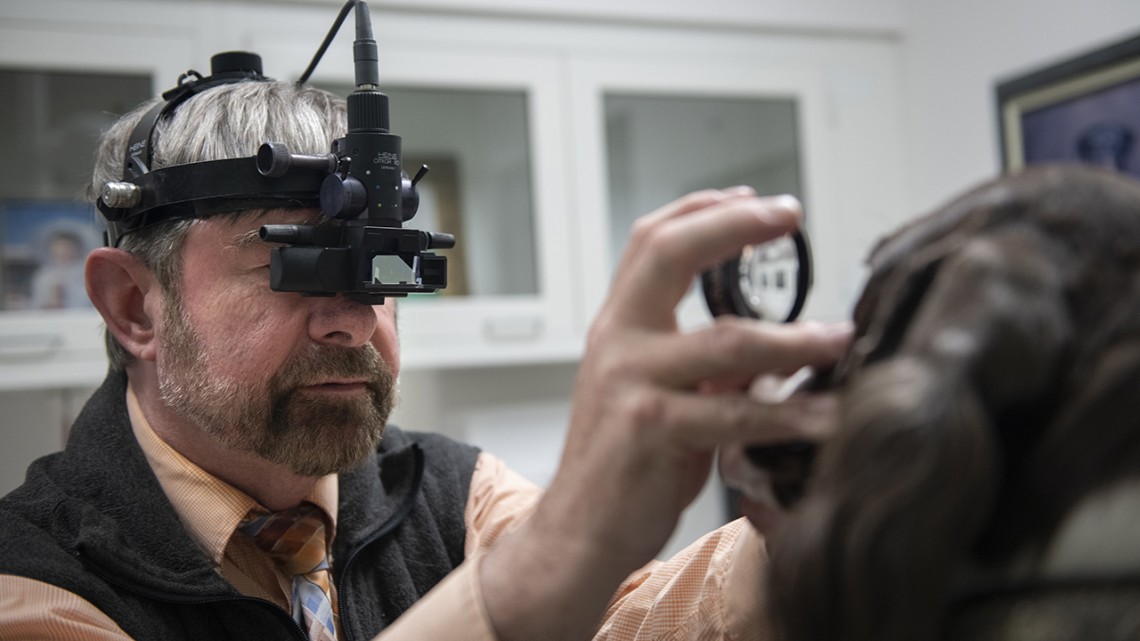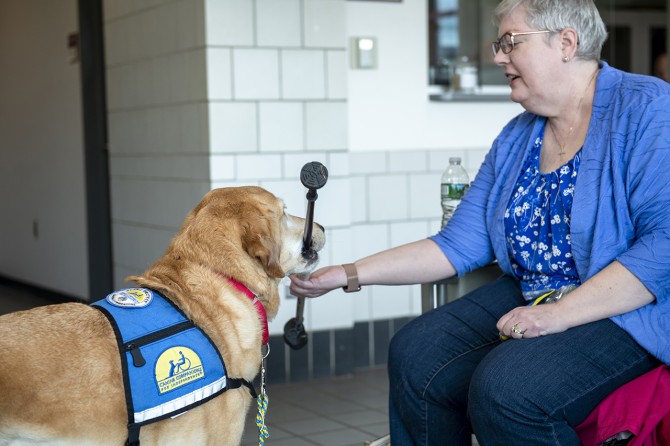
Dr. Thomas Kern examines Cachet’s eyes as part of the yearly ACVO/StokesRx event, which provides free eye examinations to service animals each May.
Cornell supports service animals with free eye examinations
By Melanie Greaver Cordova
This month, Cornell joined other veterinary hospitals in giving back to the animal companions that dedicate their lives to helping humans.
The College of Veterinary Medicine opened up slots in the month of May for the American College of Veterinary Ophthalmologists (ACVO)/StokesRx National Service Animal Eye Exam, a yearly philanthropic event that provides free eye examinations to qualified service and working animals.
“For a service animal, having good vision in their working life contributes not just to their well-being but also ensures they can do their job well,” said Dr. Thomas Kern, associate professor in the Department of Clinical Sciences.
Cornell has participated in this event since 2014, with Kern and several other veterinary ophthalmologists conducting the examinations as members of the ACVO. Across the United States and Canada, participating institutions and members provide over 7,000 eye examinations each May. This year, seven organizations participated in New York, with locations in Ithaca, Albany, Buffalo, Long Island and New York City.
As part of this event, Cornell’s veterinary hospital has screened not only seeing-eye dogs, but dogs that can alert to seizures, detect a diabetic fluctuation and assist with mobility. Others are PTSD companions and therapy dogs.
“From Cornell’s standpoint, one of the real benefits is that students, residents and faculty get to see the range of service-animal jobs,” said Kern. “You really develop an appreciation for that aspect of the human-animal bond.”
This year, ACVO opened up appointments to qualified horses as well, but only owners of canine patients signed up for slots at Cornell.
One such canine patient was a female English springer spaniel named Cachet. Owner Cathy Flanders of Bath, New York, takes Cachet, a therapy dog, and her other spaniel Calvin to visit with residents in nursing care facilities around the Finger Lakes. The two spaniels also work with elementary school students in an after-school reading club during the school year. In addition to being therapy dogs, both are American Kennel Club show champions.
Their work doesn’t end there. Each year, Flanders takes Cachet and Calvin for a month to Maine, where they visit two short- and long-term rehabilitation centers five days a week. “She [Cachet] has her regulars,” said Flanders. “Their eyes light up when they see her.”
Flanders is a member of the Alliance of Therapy Dogs and is applying to become a tester/observer for the group. When she started taking Calvin to obedience classes, the instructor introduced her to therapy work. In the last three years, Calvin has made over 300 therapy visits. Cachet has made about 200.
Syracuse-area resident Jeanne McArdle, M.P.S. ’94, has participated in the ACVO/StokesRx event each year since Canine Companions for Independence placed service dog Aslan with her in 2013. McArdle has a connective tissue disorder, which makes it difficult to bend over to pick things up. Aslan, a Labrador retriever mix, is trained to do things like take clothes out of the washer and dryer, close the dishwasher door, open doors and drawers, pull a trash bag off the roll and flip light switches.
“I’ve taken the commands he was trained with and expanded on them,” said McArdle, who trained dogs as a hobby for years. Aslan can even pick up credit cards from the floor and grab items off of lower shelves at the grocery store.
“I am incredibly grateful for the opportunity to have Dr. Kern, a world-class veterinary ophthalmologist, examine Aslan to make sure his vision is good enough for him to work,” said McArdle. “He is a very loving, tender dog who brings gentleness out in everyone he meets. I am blessed to have him.”
Added Flanders: “I love the veterinarians here. It’s a distance to drive here from Bath, but they’re great. It’s well worth it.”
Melanie Greaver Cordova is a staff writer with the College of Veterinary Medicine.
Media Contact
Get Cornell news delivered right to your inbox.
Subscribe


